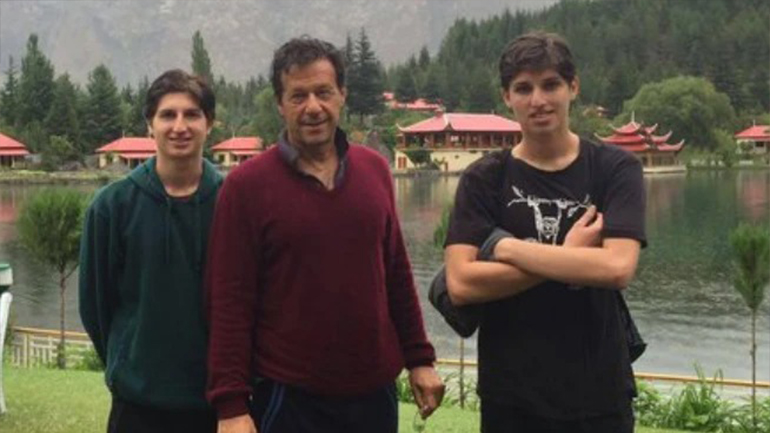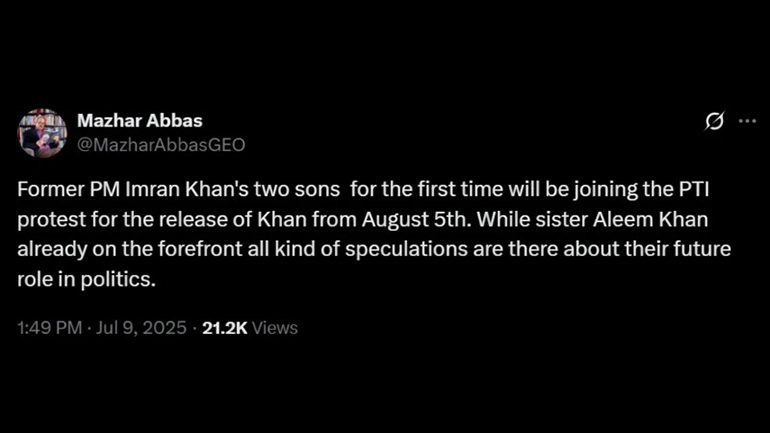

The PTI resistance movement for the release of Imran Khan has gained new momentum with growing discussions around the possible involvement of Imran Khan's sons, Qasim Khan and Sulaiman Khan. Meanwhile, Jemima Khan, Khan’s former wife, issued a strong statement expressing her concern that “my children are not being allowed to speak to their father, Imran Khan, on the phone,” highlighting the harsh conditions of Imran Khan's imprisonment, including nearly two years in solitary confinement. Jemima further alleged that the Pakistani government warned that if Imran’s sons visit him, “they will be arrested and thrown behind bars.” She criticized this action, calling it not political but “personal vengeance”, stating, “This doesn’t happen in a democratic state.” This possible involvement of Imran Khan's children has sparked wide debate in political and social circles. Many are drawing parallels with dynastic politics in Pakistan, comparing Qasim and Sulaiman’s potential entry to that of Benazir Bhutto during Zulfikar Ali Bhutto’s imprisonment, and Maryam Nawaz during Nawaz Sharif’s political battles. Although Qasim and Sulaiman Khan have lived in the UK with Jemima and remained outside politics during their father's premiership, their recent social media support for Imran Khan and public interviews have fueled speculation about the political future of PTI. The big question remains: Could Imran Khan’s sons help revive his party's movement and reshape its leadership?

The first public statement regarding Qasim and Sulaiman Khan, the sons of former Prime Minister Imran Khan, was made by his sister Aleema Khan during a media briefing outside Adiala Jail. She revealed that both Imran Khan's sons had expressed their intention first to visit the United States to raise awareness about the human rights situation in Pakistan, and then later travel to Pakistan to take part in the PTI protest movement. Following her remarks, Rana Sanaullah Khan, the advisor to the Prime Minister on political affairs, hinted during a local TV interview that if Imran Khan’s sons participated in any form of political movement within Pakistan, they could be arrested. PTI’s official response soon followed, stating that “Aleema Khan has confirmed Qasim and Sulaiman intend to come to Pakistan because they have been denied contact with their father for several months.” The statement emphasized that the matter should be taken seriously. It reminded the government that in any democratic society, the families of political leaders should not be targeted or politically victimized. In its social media statement, Pakistan Tehreek-e-Insaf (PTI) further added that “Qasim and Sulaiman’s safety must not be politicized or endangered.”

Following Aleema Khan’s statement, several PTI leaders have expressed hope that Imran Khan’s sons, Qasim and Sulaiman Khan, will not only return to Pakistan but also take an active part in the anti-government protest movement. Zulfi Bukhari, a close associate of Imran Khan and his family, confirmed that Imran Khan's sons are likely to return and join the ongoing protest campaign. According to Bukhari, "This will make a significant impact and will boost the morale of party workers." However, political analyst Zagham Khan believes that the return of Qasim and Sulaiman seems unlikely at this stage. He pointed out that “They might not even possess valid Pakistani passports.” In such a case, the FIA (Federal Investigation Agency) could cancel their visas at the airport itself. When asked about the possibility of arrest, Zagham Khan stated that “These are merely intimidation tactics.”
Senior journalist Mazhar Abbas wrote on X (formerly Twitter) that Imran Khan’s sons will, for the first time, take part in the PTI protest movement starting from August 5 for their father's release. He wrote, “The former Prime Minister’s sister is already at the forefront, and now speculation is intensifying over the role and political future of his sons.” According to Zagham Khan, both sons of the former prime minister can “mobilize the Pakistani diaspora while living abroad.” "Being part of the British elite, they can also influence decision-makers in the UK," he added. Imran Mukhtar, a journalist with The Nation who closely follows PTI politics, believes that “If, despite all the new obstacles, they do come to Pakistan, running a political campaign in the extreme weather and hostile conditions will not be easy.” According to him, many PTI leaders are facing legal cases, and “with the state taking an even tougher stance, leading such a party would be no less than a challenge.” Zagham Khan also noted that “The success of any protest movement depends on public momentum. If large crowds continue to show up day after day, the movement might gain traction. But if people only appear on the 26th and disappear on the 27th, the protest is unlikely to succeed.”

Dynastic politics is perhaps a well-known concept in the third world, particularly in South Asian countries. In Pakistan, the debate around political dynasties is longstanding. After the death of the country’s founder, Muhammad Ali Jinnah, his sister Fatima Jinnah entered the political scene and contested the presidential election against the military dictator Ayub Khan. When Pakistan’s first elected Prime Minister Zulfikar Ali Bhutto was imprisoned under General Zia-ul-Haq’s martial law, his wife Nusrat Bhutto and daughter Benazir Bhutto led the resistance movement. In the Pakistan Muslim League (N), the legacy continued from Nawaz Sharif to his brother Shehbaz Sharif, and now to his daughter Maryam Nawaz. In the Awami National Party (ANP), leadership remained within the family of Khan Abdul Ghaffar Khan, famously known as Bacha Khan. Across the border in India, after the country’s first Prime Minister, Jawaharlal Nehru, his daughter Indira Gandhi took office, and following her assassination, her son Rajiv Gandhi also became Prime Minister. Today, the Indian National Congress is led by Rahul Gandhi, Rajiv's son. In Bangladesh, after the assassination of the first Prime Minister, Sheikh Mujibur Rahman, his daughter, Sheikh Hasina Wajed, emerged as a prominent political leader. After holding power for many years, her government was recently overthrown following a massive protest movement. Journalist Cyril Almeida commented on social media that “Anti-dynasty Imran Khan is now learning why family becomes so integral to politics — because at decisive moments, when you're surrounded by crisis, it’s often only family you can trust to stand by and fight for you.” On the criticism surrounding dynastic trends in Imran Khan’s political approach, analyst Zagham Khan said it’s true that Imran Khan’s politics is now also taking a dynastic turn. In his view, “Imran Khan’s sister Aleema Khan already holds a key position, and now if his sons also join the movement, they are unlikely to let anyone else take the central role either.”
Powered by Froala Editor